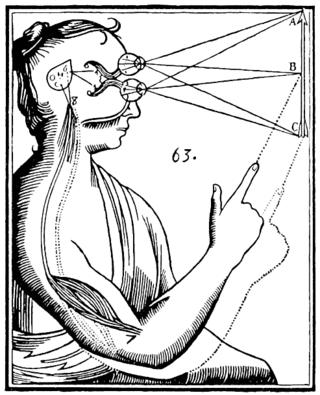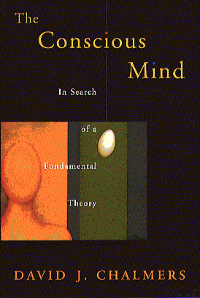Related Research Articles
Epiphenomenalism is a position on the mind–body problem which holds that physical and biochemical events within the human body are the sole cause of mental events. According to this view, subjective mental events are completely dependent for their existence on corresponding physical and biochemical events within the human body, yet themselves have no influence over physical events. The appearance that subjective mental states influence physical events is merely an illusion. For instance, fear seems to make the heart beat faster, but according to epiphenomenalism the biochemical secretions of the brain and nervous system —not the experience of fear—is what raises the heartbeat. Because mental events are a kind of overflow that cannot cause anything physical, yet have non-physical properties, epiphenomenalism is viewed as a form of property dualism.
A mental event is any event that happens within the mind of a conscious individual. Examples include thoughts, feelings, decisions, dreams, and realizations. These events often make up the conscious life that are associated with cognitive function.
A subject is a unique being that exercises agency or participitates in experience, and has relationships with other beings that exist outside itself.
Solipsism is the philosophical idea that only one's mind is sure to exist. As an epistemological position, solipsism holds that knowledge of anything outside one's own mind is unsure; the external world and other minds cannot be known and might not exist outside the mind.

Consciousness Explained is a 1991 book by the American philosopher Daniel Dennett, in which the author offers an account of how consciousness arises from interaction of physical and cognitive processes in the brain. Dennett describes consciousness as an account of the various calculations occurring in the brain at close to the same time. He compares consciousness to an academic paper that is being developed or edited in the hands of multiple people at one time, the "multiple drafts" theory of consciousness. In this analogy, "the paper" exists even though there is no single, unified paper. When people report on their inner experiences, Dennett considers their reports to be more like theorizing than like describing. These reports may be informative, he says, but a psychologist is not to take them at face value. Dennett describes several phenomena that show that perception is more limited and less reliable than we perceive it to be.

Sentience is the ability to experience feelings and sensations. The word was first coined by philosophers in the 1630s for the concept of an ability to feel, derived from Latin sentiens (feeling), to distinguish it from the ability to think (reason). In modern Western philosophy, sentience is the ability to experience sensations. In different Asian religions, the word "sentience" has been used to translate a variety of concepts. In science fiction, the word "sentience" is sometimes used interchangeably with "sapience", "self-awareness", or "consciousness".

In the philosophy of mind, mind–body dualism denotes either the view that mental phenomena are non-physical, or that the mind and body are distinct and separable. Thus, it encompasses a set of views about the relationship between mind and matter, as well as between subject and object, and is contrasted with other positions, such as physicalism and enactivism, in the mind–body problem.

Thomas Nagel is an American philosopher. He is the University Professor of Philosophy and Law Emeritus at New York University, where he taught from 1980 to 2016. His main areas of philosophical interest are legal philosophy, political philosophy, and ethics.
In the philosophy of mind and consciousness, the explanatory gap is the difficulty that physicalist philosophies have in explaining how physical properties give rise to the way things feel subjectively when they are experienced. It is a term introduced by philosopher Joseph Levine. In the 1983 paper in which he first used the term, he used as an example the sentence, "Pain is the firing of C fibers", pointing out that while it might be valid in a physiological sense, it does not help us to understand how pain feels.

Eliminative materialism is a materialist position in the philosophy of mind. It is the idea that the majority of mental states in folk psychology do not exist. Some supporters of eliminativism argue that no coherent neural basis will be found for many everyday psychological concepts such as belief or desire, since they are poorly defined. The argument is that psychological concepts of behavior and experience should be judged by how well they reduce to the biological level. Other versions entail the nonexistence of conscious mental states such as pain and visual perceptions.
The knowledge argument is a philosophical thought experiment proposed by Frank Jackson in his article "Epiphenomenal Qualia" (1982) and extended in "What Mary Didn't Know" (1986).

The hard problem of consciousness is a philosophical problem concerning why and how humans and other organisms have qualia, phenomenal consciousness, or subjective experiences. This is in contrast to the "easy problems" of explaining the physical systems that give humans and other animals the ability to discriminate, integrate information, perform behavioural functions, or provide behavioural reports, and so forth.
New mysterianism, or commonly just mysterianism, is a philosophical position proposing that the hard problem of consciousness cannot be resolved by humans. The unresolvable problem is how to explain the existence of qualia. In terms of the various schools of philosophy of mind, mysterianism is a form of nonreductive physicalism. Some "mysterians" state their case uncompromisingly ; others believe merely that consciousness is not within the grasp of present human understanding, but may be comprehensible to future advances of science and technology.
A philosophical zombie is a being in a thought experiment in philosophy of mind that is physically identical to a normal person but does not have conscious experience.
In philosophy of science and philosophy of mind, cognitive closure is the proposition that human minds are constitutionally incapable of solving certain perennial philosophical problems. Owen Flanagan calls this position anti-constructive naturalism or the "new mysterianism" and the primary advocate of the hypothesis, Colin McGinn, calls it transcendental naturalism acknowledging the possibility that solutions may be knowable to an intelligent non-human of some kind. According to McGinn, such philosophical questions include the mind-body problem, identity of the self, foundations of meaning, free will, and knowledge, both a priori and empirical.

Philosophy of mind is a branch of philosophy that studies the ontology and nature of the mind and its relationship with the body. The mind–body problem is a paradigmatic issue in philosophy of mind, although a number of other issues are addressed, such as the hard problem of consciousness and the nature of particular mental states. Aspects of the mind that are studied include mental events, mental functions, mental properties, consciousness and its neural correlates, the ontology of the mind, the nature of cognition and of thought, and the relationship of the mind to the body.

"What Is It Like to Be a Bat?" is a paper by American philosopher Thomas Nagel, first published in The Philosophical Review in October 1974, and later in Nagel's Mortal Questions (1979). The paper presents several difficulties posed by consciousness, including the possible insolubility of the mind–body problem owing to "facts beyond the reach of human concepts", the limits of objectivity and reductionism, the "phenomenological features" of subjective experience, the limits of human imagination, and what it means to be a particular, conscious thing.

In philosophy of mind, qualia are defined as instances of subjective, conscious experience. The term qualia derives from the Latin neuter plural form (qualia) of the Latin adjective quālis meaning "of what sort" or "of what kind" in relation to a specific instance, such as "what it is like to taste a specific apple — this particular apple now".

The Conscious Mind: In Search of a Fundamental Theory was published in 1996, and is the first book written by David Chalmers, an Australian philosopher specialising in philosophy of mind. Although the book has been greatly influential, Chalmers maintains that it is "far from perfect", as most of it was written as part of his PhD dissertation after "studying philosophy for only four years".
The concept of absent qualia is one of two major functionalist objections to the existence of qualia, the other being the inverted spectrum hypothesis. Qualia is a philosophical term used to refer to an individual's subjective experience, that is to say, the way something feels to that individual at that particular moment.
References
- Michael, L.A. (2007). The Principles of Existence & Beyond: Revelation of Enigma of the Existence. Visual Memes. ISBN 978-1-84799-199-7. OCLC 749947766.
- Song, D. Subjective Universe: Interweaving Matter and Mind through Cyclical Time. 2020
- ↑ Nagel, Thomas (1974) What is It Like to Be a Bat?The Philosophical Review LXXXIII, 4 (October): 435–50.